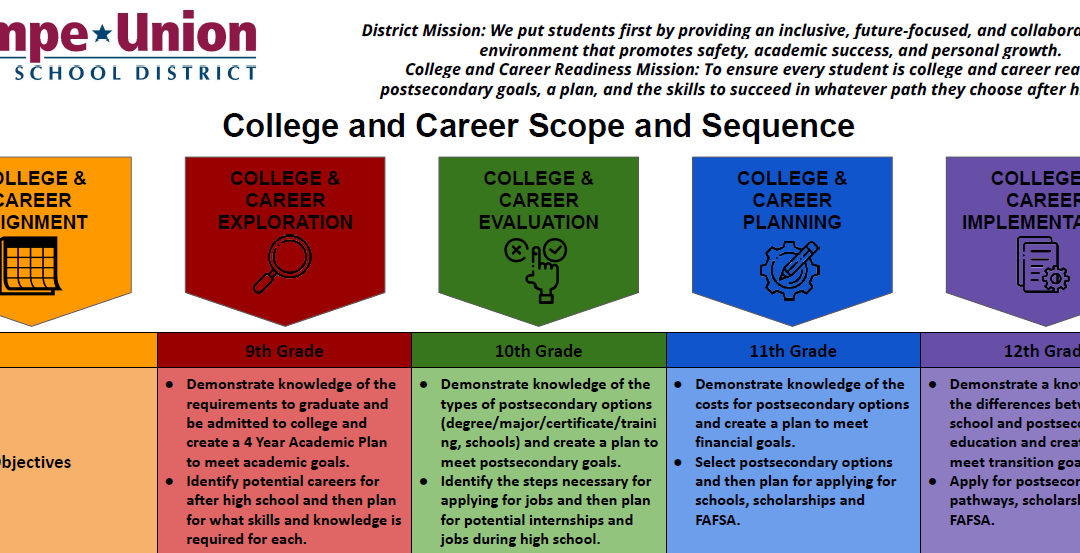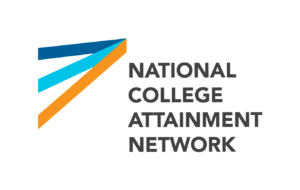Explore these strategies for student success
District Leadership is Publicly Committed to Students’ Postsecondary Success
- District enacts policies and sets measurable goals to improve students’ college and career readiness, access, and outcomes.
- District publicly defines and commits to high quality college and career advising for each student, across all achievement levels.
- District assigns and empowers a senior leader with clear responsibility for these goals and commitments.
- District leadership and board regularly monitor and report on progress towards these goals and commitments.
- District leadership team integrates these goals into district priorities to build coherence in priorities, communication and support.
District Sets Strategy and Allocates Resources to Reach Postsecondary Goals
- District strategic plans and annual planning and budgeting processes detail strategies to reach goals and commitments.
- District equitably allocates financial and human resources necessary for implementation.
- Leaders use data and seek feedback from educators, students and families to identify successful approaches and unmet needs.
- Leaders codify and embed successful approaches in roles, routines, or policies so they are not dependent on individuals.
District Ensures that Schools Have Capacity to Support Students
- District supports schools in creating a college and career readiness culture, organizing school-based teams around the shared vision, and establishing school-level ownership of these strategies and goals.
- District supports schools in creating structures that increase the amount of effective advising students receive during the school day.
- District ensures school personnel have access to receiving expertise, high-quality professional learning, supports, and tools to reach goals and meet commitments.
District Collaborates with Postsecondary Institutions and Community Partners
- District aligns strategies, student supports, and goals with postsecondary institutions, community-based organizations, employers, and other key partners.
- District collaborates with partners to establish clear expectations, roles, and responsibilities.
- District partners to implement equitable access to coherent postsecondary course pathways and career-connected learning opportunities.
- District and community partners collectively monitor progress of district and school goals.
District uses Real-Time Data to Continuously Improve Postsecondary Advising and Outcomes, Empower Students and Families
- District and school leaders regularly review disaggregated data to improve students’ experiences, college and career milestones, and outcomes.
- Educators have access to and training on tools that help track and organize postsecondary data and educators use that data to inform supports and advising for students.
- District engages in improvement cycles that improve advising and lead to student outcome improvements.
- Students and families are supported to use data to explore postsecondary options and monitor progress in order to achieve college and career goals.
Resources and Approaches from the Field

Tempe CCR Framework, Sequence Offer Models for Other Districts, Schools
A grade six-12 college and career readiness framework from an Arizona school district provides a model for other districts who want to improve their postsecondary advising and move students...

rootEd Alliance & Missouri Districts Partner to Transform Rural Students’ Futures
Across Missouri, rootEd Alliance is partnering with districts and high schools to ensure every student graduates with a clear plan for their future, whether that be entering college, career...

BRIGHT SPOT: Big Wins Through Culture Change in Elgin, IL
The second largest school district in Illinois, Elgin U-46 partnered with OneGoal to accelerate efforts to prepare their large and diverse student population for college and career. The partnership...

RESOURCE: Senior Class Data Huddles: Rally Around Data!
Senior year can be confusing for students and it is critical the trusted adults providing them postsecondary advice don’t further add to that confusion! During this session at the National College...
View Our Latest
Read our recent commentary “Here are 5 keys for student success beyond high school” in District Administration to learn more about the framework.
WHO WE ARE
Leaders from the following organizations have contributed to this collective effort:
• Korynn Schooley and Taylor Pratt, Achieve Atlanta
• Janice Bloom and Ally Levy, CARA: College Access: Research & Action
• Danette Knudson, Phyllis Harvey-Buschel, Kellie Nakano Sharon Rivera and
Juliette Schindler, College Success Foundation
• Sherry McLaughlin and Sam Purdy, RISE Network
• Donald Kamentz, Marco Heredia and Chad Spurgeon, Contigo ED
• Ryan Reyna, Michael Deuser, and Briana Falduti, Education Strategy Group
• Ben Daley, Edgar Montes and Ben Sanoff, High Tech High Graduate School of Education
• Chris Reynoso, Kristi Singletary and Katie Suter, KIPP Foundation
• Elizabeth Morgan and Bill DeBaun, National College Attainment Network
• Karla Robles, Andy Schmitz, Milissa McClaire Gary and Andraya White, OneGoal
• Ben Mackey and Farhana Rabbi, Texas Impact Network
• Kimberly Hanauer, UnlockED
• Gene Pinkard, Aspen Education & Society Program
• Kaycee Brock, Charter School Growth Fund
• Traci Lanier, 10,000 Degrees
• Chantelle George, Chantelle George Consulting
• Alissa Peltzman
• Bill Tucker, Jenny Mosley and Jacklyn Altuna Willard, The Bill & Melinda Gates Foundation
WE SUPPORT EFFECTIVE ADVISING ACROSS THE COUNTRY














